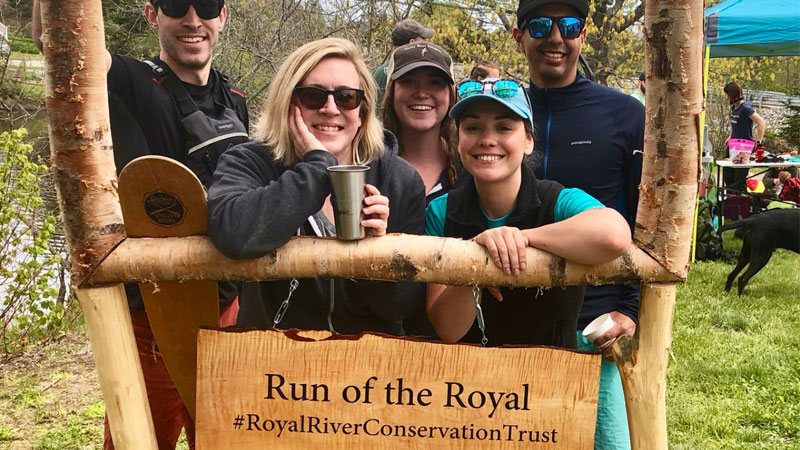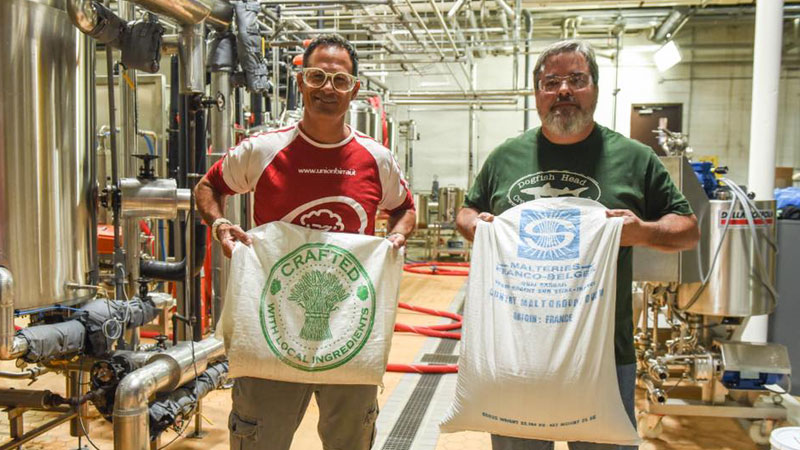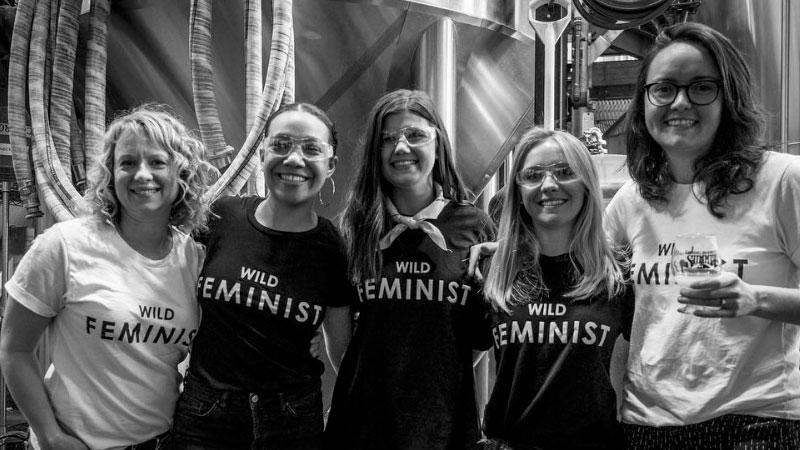Brothers Daniel and David Kleban started Maine Beer Company armed with a charitable ethos and decisive motto: “Do What’s Right.” The statement appears on Maine Beer packaging, signage, and apparel to this day.
“At Maine Beer Company, we try to do things correctly,” Anne Marisic, marketing coordinator at MBC, says. “Whether that’s within the company, in the community, and with the environment.”
MBC is one of several breweries whose philanthropic efforts specifically target their communities to renew their resources. The beer industry may be getting increasingly corporate, but these charitably minded brewers think local. They support water conservation efforts to offset the considerable ecological footprint of brewing, raise funds for artistic and philanthropic causes important to their hometowns, and partner with nonprofits to put their money where it matters most.
This may sound like fuzzy, feel-good filler. It’s not. While some of the more outspoken industry members take to their keyboards or fill the editorial pages about matters of independence, Brewers Association initiatives, and ownership (not to mention the petty social media feuds of Beer Twitter), there are some organizations taking a lead on what’s good in the brewing world.
Those things aren’t mutually exclusive, of course. But sometimes it’s more important to focus on benevolence than beef.

*
“You can’t have good beer without clean water,” Tucker Berta Sarkisian of SweetWater Brewery in Atlanta, says.
According to Sarkisian, the brewery has netted “well over a $1 million” for its clean water initiatives. Atlanta’s main water source is the Chattahoochee River, and the site holds particular meaning for outdoorsman and Sweetwater founder Freddy Bensch, who fishes and paddles there.
“We started providing people and beer for river cleanups,” Sarkisian says. As Sweetwater grew, so did its support for Waterkeeper Alliance, an environmental nonprofit started by Robert F. Kennedy Jr. that centers on clean waterways.
Sweetwater works with the Waterkeeper Alliance in all 22 states where its beer is distributed, and donates $100,000 each summer to partnering organizations to help clean up waterways and help preserve natural habitats. Its efforts are funded in part by sales of a line of summer beers called the Protect Natural Habitat Pack. This is a win-win for the brewery and its fans: We get a product we like while indirectly supporting environmental causes.
“It goes back to Freddy’s love of the outdoors,” Sarkisian says. “He’s passionate about craft beer, but I’ve never seen him happier than when he’s out on the water fly fishing. He realized he can use craft beer to give back to the things he enjoys: the outdoors, clean waters, and protecting natural habitats.”
Sweetwater is also relaunching its “Stack a Fish, Stock a Stream” campaign in which cans of its 420 IPA will be adorned with one part of a rainbow trout: head, body, or tail. Drinkers who accumulate three cans that form a whole fish can snap a picture of the beer with the hashtag #FishforaFish, and Sweetwater will stock a stream with a rainbow trout.

*
“Of all the charitable giving, only 3 percent goes to environment,” MBC’s Marisic says. According to giving statistics on Charity Navigator, that was about $8 billion in 2017. “As a business that uses a lot of water, we’re very aware of how important our environment is. We need hops, we need water, we need good grains. We felt it was a good direction to go.”
As a result, most of MBC’s charitable giving focuses on ecology. It is aligned with 1% for the Planet, an international organization whose members pledge 1 percent of their annual sales to environmental nonprofits. The idea is that, while 1 percent seems insignificant to an individual, if enough individuals take part it makes a significant impact.
“As a business, what you give at the beginning might be a small number,” Marisic says. “But eventually the amount given back grows with company.”
MBC has also worked with local nonprofits like Maine Audubon and Friends of the Katahdin Woods and Waters National Monument. (Just how endangered are these areas? Katahdin was originally designated by President Trump for review.)
Based out of Freeport, Maine, just north of Portland, MBC also partners with the Center for Wildlife in nearby Cape Neddick, Allied Whale, and the Dian Fossey Gorilla Fund.
King Titus, MBC’s hearty porter, is named for the silverback gorilla. And a whale named Lunch gives its name to MBC’s IPA, itself a whale in the craft beer community.
*
Dogfish Head in Milton, Del., has its own strongly worded mantra: “Think Globally, Act Locally.” The company lives by these words, and is on pace to contribute more than $1 million by 2019 to the Delaware chapter of the Nature Conservancy, the biggest beneficiary of the annual Dogfish Dash road race. The company has also contributed to water cleanups, maintains bike and running paths, and has helped establish canoe and kayak launches.
“Visitors are coming in here and they’re exploring our backyard,” Mark Carter, director of Beer & Benevolence, Dogfish Head’s philanthropic division, says. “The better we can support our backyard, the better we can support our visitors.
“Plus, we have our employees,” Carter adds. “We’ve grown from a really small company to one that employs hundreds of them, so part of it is also a maturation of the company. It’s our responsibility to make [coastal Delaware] the most awesome place we can.”
The brewery aims to support, not dictate, the concerns of longstanding residents and businesses on Rehoboth Beach. The destination is home to several LGBTQ-identifying-and-owned businesses, many of which historically looked to one another for business advice, guidance, and patronage in the absence of mainstream support. Those relationships helped birth a close-knit business community.
Dogfish Head’s Mariah Caligione is a founding member of the Rehoboth Beach Independent Film Festival, and the company has contributed funding for the Delaware Botanic Gardens in nearby Dagsboro, Del.
From September through June, Dogfish Head hosts twice-monthly Benevolence Nights at the brewpub, marrying local nonprofits and musical acts. Partner organizations have included Surfrider Foundation and MERR (Marine Education Research Rehabilitation), and receive 10 percent of the proceeds. This fall, Benevolence Nights will showcase a group that focuses on co-workers with disabilities in October and a veterans group in November.
“From the very start, we were always thinking about the community,” says Carter. “When we started, our beers weren’t as dialed in, but folks just kept coming in and giving us a shot. The community supported us and it was our natural duty to say, ‘Hey, you’re going to bat for us, we’ll go to bat for you.’”
*
In Bend, Ore., 10 Barrel felt a sense of civic duty long before it was acquired by AB-InBev.
“Our pub communities are so much more than where we work, they’re where we live,” owner Jeremy Cox says. “If we have the means and ability to help contribute to local causes through our work, we feel that we have an obligation and responsibility to do that.”
The brewery has hosted a Charity of the Month program since opening its first Bend pub in 2010; the program is now at its brewpubs in Portland, Boise, Denver, and San Diego. The monthly initiative is open to local charities through an online application, but it’s mostly driven by what 10 Barrel team members are passionate about, like the Wildland Firefighter Foundation, for which 10 Barrel helped raise $20,000 last year.

True to its outdoors-loving ethos, 10 Barrel donates portions of the proceeds of Pray for Snow (a winter beer) and Trail Beer (a Northwestern Pale Ale) to Protect Our Winters and the Outdoor Alliance, respectively. As for contributions post-acquisition, Cox claims the only thing that’s changed is that there are now more pubs from which to raise Charity of the Month donations.
*
Good beer and great breweries are inseparable from their communities. When we support a local brewery, we feel good about putting our dollars back into the community, into the pockets of people who walk the same sidewalks we do.
By giving back to the communities and environments that buy their beers and provide their resources, these breweries are further elevating the beer industry at large. They prove that brewers are looking to survive by making great beer, fostering relationships with the locals, and by becoming involved members of their business communities. It’s the latter that helps a community thrive through the best and the toughest times.
“That’s why this is a good fight,” Marisic says.
